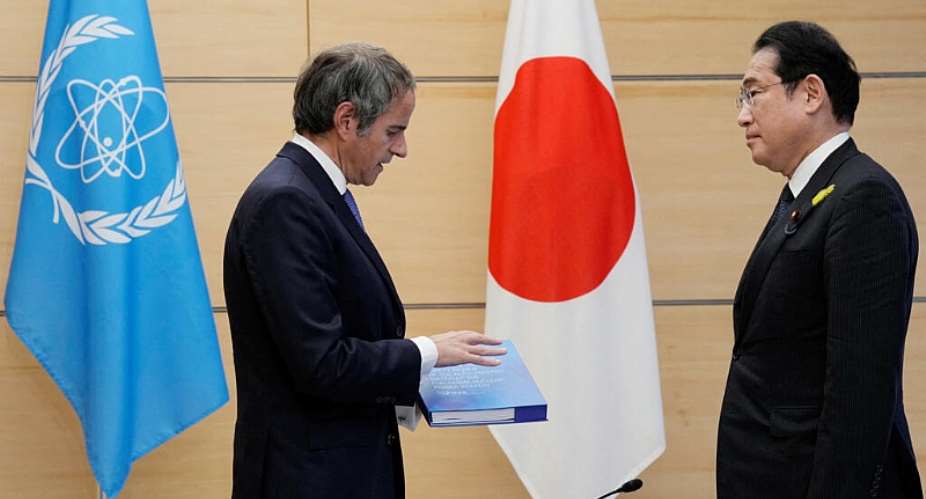Plans to discharge treated water from the Fukushima nuclear plant have cleared their last regulatory hurdle in Japan, as China said it would ban some food imports over the decision.
Friday's move by Tokyo to release the treated water into the sea over several decades comes as South Korea endorsed the plan, saying it met or exceeded international standards.
Some 1.33 million cubic metres of groundwater, rainwater and water used for cooling uranium rods have accumulated at the Fukushima nuclear plant, where several reactors went into meltdown after the 2011 tsunami overwhelmed cooling systems.
Storage space is running out, but plans by Japan and plant operator TEPCO to release the water into the sea have run into local and regional opposition.
Earlier this week, the UN nuclear watchdog said the discharge would have "negligible" effects on the environment and was in line with water releases from nuclear plants elsewhere.
Japan's government says the water release would begin by the end of summer, and on Friday the country's Nuclear Regulation Authority said the equipment and facilities to discharge the water had passed their checks.
China moves to ban Japanese imports from affected areas
The Japanese government has spent months trying to win over public opinion at home and abroad, with everything from study tours of the plant to livestreamed experiments keeping marine life in the treated water.
But none of those efforts nor the International Atomic Energy Agency's endorsement, have won over Beijing, which has accused Japan of treating the Pacific like a "sewer".
On Friday, China's customs authority said it would ban food imports from 10 Japanese prefectures over the release, and require stringent radiation tests on food from the rest of the country.
In a statement, the authority said, "China Customs will maintain a high level of vigilance," without specifying the list of Japanese prefectures affected by the ban.
Japan's foreign ministry is reportedly "studying" possible measures in response.
South Korea approves discharge plan
For its part, South Korea said Friday that its review of the Fukushima plan found it in line with international standards.
The study, which focused on whether the discharge would affect South Korean waters, found it would have "negligible consequences."
It would take up to 10 years for the treated water to circulate back into the seas around the Korean peninsula, according to the report.
The discharged water is treated to remove almost all radioactive elements apart from tritium, which is commonly found in nuclear plant wastewater pumped into the sea.
The water will be diluted with seawater before release, and then further diluted as it circulates in the ocean.
Protests and hunger strikes
However, there have been protests and even panic-buying of salt based on fears that the Fukushima water will pollute the ocean and its salt.
Some opposition lawmakers have even gone on hunger strike in protest.
However, at Seoul's sprawling Noryangjin Fish Market, many vendors said the opposition was bad for business.
This comes as IAEA head Rafael Grossi – who has been in Tokyo and Fukushima this week – is in Seoul this Friday.
Grossi underlined: "My responsibility as head of the IAEA is to show up, to have a direct conversation with all those involved and to try to answer in the best, most honest possible way, the questions that may arise."





 Akufo-Addo did not order Overlord of Gonjaland to rise and greet him- Richard Ah...
Akufo-Addo did not order Overlord of Gonjaland to rise and greet him- Richard Ah...
 Many girls sleep with dogs for money — Mona Gucci
Many girls sleep with dogs for money — Mona Gucci
 Ejisu by-election: No election is small, easy but NPP will win — Frimpong Kodua
Ejisu by-election: No election is small, easy but NPP will win — Frimpong Kodua
 No president can take credit for constructing a road in Ghana; they’re taxpayers...
No president can take credit for constructing a road in Ghana; they’re taxpayers...
 Prof. Jane Naana has shaken Ghana's political foundation, causing NPP to run hel...
Prof. Jane Naana has shaken Ghana's political foundation, causing NPP to run hel...
 I've been receiving threats after I commended NPP for completing school projects...
I've been receiving threats after I commended NPP for completing school projects...
 Bawumia is ready to debate Mahama any day – Frederick Opare-Ansah
Bawumia is ready to debate Mahama any day – Frederick Opare-Ansah
 Register births at CHPS compounds; don't come to Accra – Birth & Death Registrar...
Register births at CHPS compounds; don't come to Accra – Birth & Death Registrar...
 We never said only 10 BVDs were auctioned – EC replies IMANI
We never said only 10 BVDs were auctioned – EC replies IMANI
 Election 2024: Akufo-Addo willing to trample on Ghana’s constitution – Mahama
Election 2024: Akufo-Addo willing to trample on Ghana’s constitution – Mahama
